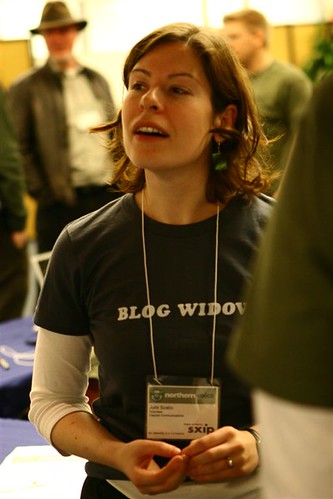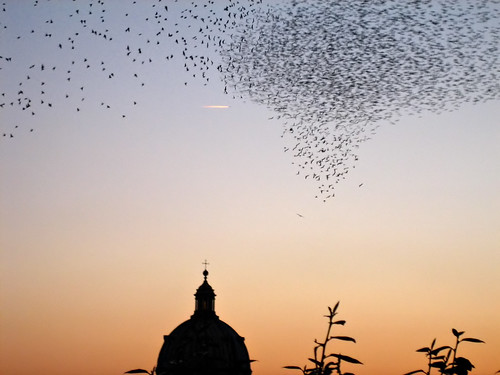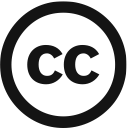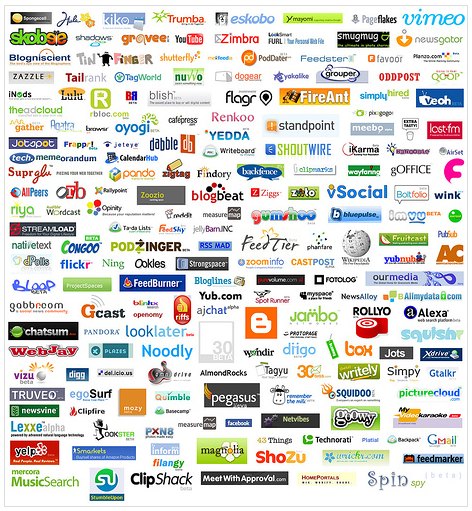Workshops/WeblogsAndWikis
This wiki page was created for a presentation at the 2007 Faculty Technology Days, at the University of Calgary.
Contents
- 1 Open, Connected & Social
- 2 First, some thoughts
- 3 Creative Commons
- 4 Where to find great Creative Commons content
- 5 Personal Knowledge Management
- 6 How most people handle it
- 7 How Web 2.0 handles it
- 8 Collaborative Knowledge Management
- 9 Social Connections
- 10 Examples from other institutions
- 11 Examples from UCalgary
Open, Connected & Social
Blogs, wikis, social software, open content, and "Web 2.0"

First, some thoughts
"Be formless... shapeless, like water. If you put water into a cup, it becomes the cup. You put water into a bottle; it becomes the bottle. You put it into a teapot; it becomes the teapot. Water can flow, and it can crash. Be like water, my friend..."
- Bruce Lee
"Communities win. Technologies don't win."
- Tim Bray (in a talk at the University of Calgary)
"... everybody just uses RSS..."
- David Wiley
"Use only that which works, and take it from any place you can find it."
- Bruce Lee
"Go public!"
- John Willinsky, speaking at Northern Voice 2007
It makes more sense to leverage the existing activities of individuals and groups, taking advantage of existing communities and processes, rather than trying to reinvent The One True System That Will Make Everything Work. It's better for Universities to be like water, adapting to what students and faculty are doing, or are able to do, on their own, rather than asserting a preordained solution from on high.
Creative Commons
Creative Commons: Share, reuse, and remix — legally.
Creative Commons provides free tools that let authors, scientists, artists, and educators easily mark their creative work with the freedoms they want it to carry. You can use CC to change your copyright terms from "All Rights Reserved" to "Some Rights Reserved."
Where to find great Creative Commons content
- CreativeCommons.org (includes handy metasearch tool)
- Flickr.com
- Google.com
Personal Knowledge Management

Outboard Brain

How most people handle it

Files

Books and assorted media

Why?
- archival
- flexible(ish)
- hard to search
- hard to share
How Web 2.0 handles it
Tags

Networks

Why?
- also archival, but also fresh
- flexible
- easy to search
- easy to share (and collaborate, and build upon)
Open, Connected & Social
A presentation, in four parts, on the topics of creating and using content openly, reusing existing resources, and connecting content and people in a decentralized, flexible model. Your tour guides for this ride are Brian Lamb from UBC, Jim Groom from University of Mary Washington, D'Arcy Norman from the University of Calgary, and Alan Levine from the New Media Consortium.
Collaborative Knowledge Management

blogs
dynamic networks formed within the "blogosphere"
- get your own blog at any number of free services
- UCalgaryBlogs.ca
- WordPress.com
- EduBlogs.org
- Blogger.com
- and many, many more!
wikis
collaboratively edited web pages (and entire sites)
- Wiki in the Classroom rubrick
- Wikipedia: School and University Projects
- use existing wikis
- get your own wiki
the whole is greater than the sum of its parts...
- del.icio.us (bookmarks)
- Flickr (photos and images)
- YouTube (videos)
Social Connections

Find your network(s)
- Technorati - use it to find your own networks for potential collaboration
- digg.com - find and rate resources
- web stats - follow referrals
- Facebook - find colleagues and friends from the real world
- Twitter - follow friends and colleagues across the internets
The Power of Positive Narcissism
Link to blogs/wikis that you like, use and trust. They will likely find the link and if they like, use and trust your blog, they may reciprocate.
Examples from other institutions
Examples from UCalgary
- UCalgaryBlogs.ca (individual, class/course, project blogs and websites)
- weblogs.ucalgary.ca (older system, communal publishing space)
- wiki.ucalgary.ca
- UCalgary on Facebook
- UCalgary on Flickr



